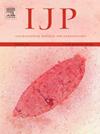Bat microfilariae in the cityscape: a transmission tale between bats, mites, and bat flies
IF 3.2
2区 医学
Q1 PARASITOLOGY
引用次数: 0
Abstract
Litomosoides includes filarial nematodes capable of infecting various vertebrate species. While Litomosoides has been extensively studied in rodents, research on its association with bats remains limited. The transmission dynamics of this parasite are complex, involving moving between different invertebrate hosts before reaching the final host. Most investigations concerning microfilariae have concentrated on their morphological characteristics, with scant attention paid to ecological aspects, particularly in human-altered landscapes. This study represents the first known documentation of Litomosoides in bats within an urban environment. It investigates their response to urbanization in their interaction with the synanthropic bat Artibeus jamaicensis and its ectoparasites. The objective was to explore the influence of urban landscapes on Litomosoides prevalence in synanthropic hosts. Blood samples were collected along urban–rural gradients, and parasite presence was confirmed through direct observation in blood smears and PCR. Phylogenetic analysis based on the mitochondrial cytochrome c oxidase subunit 1 gene (COX1), which exhibited robust support values, indicates that the microfilaria found in A. jamaicensis is closely related to Litomosoides chandleri. However, it also suggests the possibility of an unidentified, and therefore potentially new, species within the genus Litomosoides. Additionally, Litomosoides DNA was detected in Periglischrus iheringi (Acari: Spinturnicidae) and in the bat fly Trichobius intermedius collected from the bat. The parasite sequences obtained from these three interacting species exhibited a genetic distance as low as 0.002. The highest prevalences were recorded in forested areas (28.6%) compared with urban areas (21.2%). However, within the urban landscape, prevalence varied from 3.8% to 21.2%, being highest in densely built-up areas. Analysis of the urban landscape suggested that the prevalence of Litomosoides in A. jamaicensis is the result of a multifactorial and synergistic process involving ectoparasite load, host abundance, and the extent of impervious surfaces (NDBI).

城市景观中的蝙蝠微丝蚴:蝙蝠、螨虫和蝙蝠蝇之间的传播故事。
Litomosoides 包括能够感染各种脊椎动物的丝状线虫。虽然对啮齿类动物中的 Litomosoides 进行了广泛的研究,但有关它与蝙蝠的关系的研究仍然有限。这种寄生虫的传播动态非常复杂,在到达最终宿主之前会在不同的无脊椎动物宿主之间移动。大多数有关微丝蚴的研究都集中在其形态特征上,很少关注生态学方面,尤其是在人类改变的景观中。本研究首次记录了城市环境中蝙蝠体内的 Litomosoides。研究调查了蝙蝠在与同类蝙蝠 Artibeus jamaicensis 及其体外寄生虫的互动中对城市化的反应。研究的目的是探索城市景观对同类宿主中Litomosoides感染率的影响。研究人员沿城乡梯度采集了血液样本,并通过直接观察血液涂片和 PCR 来确认寄生虫的存在。基于线粒体细胞色素 c 氧化酶亚单位 1 基因(COX1)的系统进化分析表明,在 A. jamaicensis 身上发现的微丝蚴与 Litomosoides chandleri 关系密切。不过,这也表明在 Litomosoides 属中可能存在一个未确定的物种,因此有可能是新物种。此外,在Periglischrus iheringi(Acari:Spinturnicidae)和从蝙蝠身上采集的蝙蝠蝇Trichobius intermedius中也检测到了Litomosoides的DNA。从这三种相互影响的物种中获得的寄生虫序列显示出低至 0.002 的遗传距离。与城市地区(21.2%)相比,森林地区的感染率最高(28.6%)。然而,在城市景观中,流行率从 3.8% 到 21.2% 不等,建筑密集区的流行率最高。对城市地貌的分析表明,鸦片蚁体内Litomosoides的流行是一个多因素协同作用的结果,涉及到体外寄生虫负荷、宿主丰度和不透水表面的范围(NDBI)。
本文章由计算机程序翻译,如有差异,请以英文原文为准。
求助全文
约1分钟内获得全文
求助全文
来源期刊
CiteScore
8.40
自引率
2.50%
发文量
76
审稿时长
23 days
期刊介绍:
International Journal for Parasitology offers authors the option to sponsor nonsubscriber access to their articles on Elsevier electronic publishing platforms. For more information please view our Sponsored Articles page. The International Journal for Parasitology publishes the results of original research in all aspects of basic and applied parasitology, including all the fields covered by its Specialist Editors, and ranging from parasites and host-parasite relationships of intrinsic biological interest to those of social and economic importance in human and veterinary medicine and agriculture.

 求助内容:
求助内容: 应助结果提醒方式:
应助结果提醒方式:


